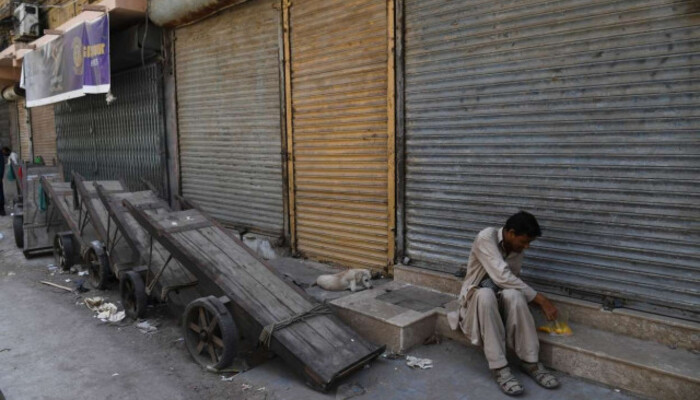The lives of daily wage earners in Karachi have been thrown into crisis after heavy rains paralyzed business activity across the city. With markets flooded and shops closing early, thousands of workers who depend on daily income to feed their families returned home empty-handed. For many, a single missed day means falling deeper into debt.
Markets grind to a halt
Karachi’s bustling commercial centers, known for their daily rush of customers, came to a standstill. Shops in major markets, including Saddar, Liaquatabad, M.A. Jinnah Road, Landhi, Korangi, Karimabad, and the Old City area, struggled to remain open. Traders reported that although some businesses initially opened in the morning, waterlogging on main roads quickly drove customers away.
By afternoon, most shopkeepers closed early, leaving daily wage earners — loaders, helpers, and sales assistants — without work. The sudden halt in activity exposed the vulnerability of thousands who rely on day-to-day earnings.
Traders raise concerns
Jamal Sehti, Patron-in-Chief of the All Karachi Traders Alliance, said that heavy rains crippled business activity in every major market. He noted that daily wage earners suffer the most in such conditions. Without work, they face immediate financial strain.
Sehti warned that if the rains continue, the financial hardships of workers will only deepen. He urged authorities to create a support mechanism for vulnerable groups during such weather emergencies.
Read: China-Pakistan Strategic Dialogue: Wang Yi Meets COAS Asim Munir in Islamabad
Voices from the ground
Workers themselves shared heartbreaking stories of struggle. Sehar Tariq, a resident of Punjab Colony who sells household items, said she could not set up her stall due to waterlogging. With no income for the day, she borrowed money from neighbors just to feed her family.
“We earn between Rs500 to Rs1,500 daily. Missing even one day pushes us into debt,” she explained. For Sehar and many like her, each working day makes the difference between survival and hunger.
Delivery workers also suffered. Adnan Ahmed, a food delivery rider, said restaurants across the city remained closed as flooded roads kept customers at home. With no orders to deliver, he and his colleagues returned home with empty pockets.
Construction sector hit hard
The construction industry, one of Karachi’s largest employers of daily wage labor, also came under strain. Haji Tasleem, who manages a group of construction workers, explained that most laborers in the city come from other parts of the country and rely entirely on daily wages.
“When it rains like this, construction stops. Workers sit idle, waiting for work that never comes,” he said. For these workers, missing several days of income threatens not just their livelihood but also their ability to send money back to families in their hometowns.
Ripple effect on urban economy
The impact of the rains extended beyond individual workers. With fewer shops open and reduced consumer activity, Karachi’s urban economy slowed significantly. From small vendors to delivery services, every sector faced disruption. Transport was also severely affected, making it difficult for workers and customers to move across the city.
Economists point out that frequent rain-induced disruptions highlight the fragility of urban planning in Karachi. Poor drainage systems and lack of infrastructure investment worsen the effects of heavy rains, turning them into full-blown economic crises.
Families under pressure
Households dependent on daily income faced the toughest challenges. Parents struggled to arrange food, while children often went without proper meals. Many families reported borrowing money from neighbors or shopkeepers to survive. For them, repeated rains mean mounting debt and little hope of repayment.
Women, who often work in small-scale home-based businesses or street vending, were particularly hard-hit. With fewer customers venturing out, many had to throw away unsold perishable goods, compounding their financial losses.
Call for government support
Community leaders and rights groups have demanded urgent intervention. They argue that the government should introduce relief funds, food aid, or cash support during extreme weather conditions. Without such mechanisms, vulnerable workers will continue to bear the brunt of natural disasters.
Experts also emphasize the need for long-term planning. They suggest investments in better drainage systems, disaster preparedness, and policies that protect informal sector workers. These measures could prevent future crises from leaving thousands of daily wage earners stranded without income.
A city waiting for relief
As rains continue to lash Karachi, uncertainty grows among the working class. Every passing day without work increases desperation. Families live on borrowed money, with no clear timeline for when life will return to normal.
For the city’s daily wage earners, the downpour is more than just a weather event — it is a threat to survival. Until sustainable support systems are put in place, every rainy season will bring with it not only waterlogging but also widespread economic hardship.
Follow us on Instagram, YouTube, Facebook,, X and TikTok for latest updates
